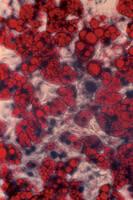The Center for Metabolism and Obesity Research, or CMOR, in the Institute for Basic Biomedical Research is an interdepartmental and interdisciplinary center established to support the advancement of our understanding of the basic biological mechanisms that regulate metabolism, and how they are dysregulated in disorders such as obesity, diabetes, stroke, and cancer. While these may seem to be divergent themes, they share common root causes in disordered energy balance, which can affect many biological systems. Thus, while CMOR investigators approach these problems from within their individual disciplines, the Center provides an opportunity to explore common scientific themes and collaborate on research combining the molecular and cellular mechanisms of metabolism with a wide range of physiological and behavioral studies. CMOR also works to facilitate the translation of discoveries to applied knowledge for therapeutics in these fields.

From Albert Lehninger’s studies of mitochondrial metabolism to Peter Pedersen’s work in bioenergetics and more, Johns Hopkins has built a distinguished legacy of discovery in the field of metabolism and systems biology. Addressing topics such as nutrient sensing, bioenergetics, and endocrine regulation, the center employs both cutting edge technologies and fundamental basic science to advance our understanding of the biology that regulates metabolism and how it is dysregulated in attendant disorders such as obesity, diabetes, cancer, and stroke.
Director: Michael Wolfgang, Ph.D.
Mission
To lead in the study and support of integrative research in the field of metabolism and obesity to advance our understanding of the biological mechanisms that regulate metabolism and how they are dysregulated in attendant disorders, such as obesity and diabetes.
Vision: Understanding how specific metabolic pathways influence biological outcomes and behavior is the goal of metabolism in our era, and is a common foundation for systems and behavioral biology. The overall goal of CMOR is to develop an infrastructure to facilitate cutting-edge research into the fundamental basic science of metabolism.
Goals
- To provide an infrastructure for scientific interactions among faculty and community.
- To integrate research using model organisms and metabolic profiling.
- To develop service and technological resources.
- To enhance the education of trainees.
- To foster interactions between CMOR and agencies that support research in metabolism and obesity.
- To disseminate knowledge to the public in the form of graduate education and to facilitate translation of this knowledge to therapeutic strategies.
- Programmatic Themes:
- Nutrient regulation/sensing encompasses metabolic pathways that deal with the disposition of carbohydrates, glucose, and lipids, which influence how energy is used to support macromolecular synthesis.
- Bioenergetics entails the conversion of catabolized molecules into energy (ATP) and reducing equivalents (NADH), the availability of which dictates the biological anabolic processes that may occur.
- Endocrine regulation denotes the humoral and neuroendocrine responses that occur to maintain homeostasis, often in relationship to nutrient availability. For example, molecules such as insulin, leptin, and hypothalamic neuropeptides respond to peripheral and central metabolic cues to sense energy balance and affect behavior. At the cellular level, these metabolic systems influence cell survival, cell cycle regulation, the expression levels of diverse proteins required for cellular functions, and cellular senescence. At the organismal level, nutrients, endocrine profiles, and bioenergetics affect reproduction, exercise capacity, CNS activity, feeding behavior, and longevity.
- Programmatic Themes:
Dysregulation of these pathways results in some of the most devastating diseases that we face, including obesity, diabetes, cancer and stroke. As we discover new regulatory roles for these metabolic pathways, we seek to apply this information towards therapeutic strategies, making the Center a timely undertaking. Most importantly, this theme provides flexibility, allowing the Center to adapt as needed in response to future needs.
Core Services in Animal Physiology
CMOR created a core service center, Coordinated Services for Metabolism Research (CSMR), to further its mission to facilitate collaborative research in metabolism. Since 2008, CSMR has provided access to shared instrumentation, testing space and expertise for in vivo metabolic phenotyping in rodent models to the Johns Hopkins University community and beyond. Susan Aja, Ph.D., manages the CSMR, supervising and running studies, providing expertise and training, and referring researchers to additional resources to support their projects.
Faculty
Research Faculty
- Lili Ayala Barouch, M.D.
- Todd Tarquin Brown, M.D., Ph.D.
- Adrian Sandra Dobs, M.D., M.H.S.
- Peter Espenshade, Ph.D.
- Dipali Sharma, M.S., Ph.D.
- Michael Wolfgang, Ph.D.
- Guang William Wong, Ph.D.
- Jeffery Hunter Young, M.D., M.H.S.
- Heng Zhu, Ph.D.
Additional Faculty
Susan Aja
Department of Neuroscience

Susan Aja brings broad experience in metabolism-related research and project management to her role as director for the CMOR service core, Coordinated Services for Metabolism Research (CSMR). She earned her bachelor’s and doctorate degrees in physiology at University of California, Davis, conducted postdoctoral training in behavioral neuroscience at the Johns Hopkins University School of Medicine, and has been school of medicine faculty since 2002. Dr. Aja’s research interests have been central and peripheral nervous system neurotransmitters, neuropeptides, amp-activated protein kinase, fatty acid metabolism modulation, and TCA-cycle/mitochondrial health in the regulation of energy balance in metabolic health and disease. Additional activities include her role since 2015 as client liaison for the Molecular Determinants Core at Johns Hopkins All Children’s Hospital. Dr. Aja is committed to guiding researchers to optimal resources and expertise, and coordinating projects to successful outcomes.
Bibliography: https://pubmed.ncbi.nlm.nih.gov/?term=Aja+S&cauthor_id=32313611
Contact information:
Michele Shermak
Department of Surgery
Michele Shermak, M.D., is the Chief of Plastic Surgery at the Johns Hopkins Bayview Medical Center and also a member of the Center for Bariatric Surgery. Clinically, she specializes in the latest techniques in aesthetic and breast surgery. Her research focuses on the basic science of soft tissue healing, bone healing, and tissue engineering, and she is also interested in the effects of weight loss on adipocyte physiology and metabolism.
Email: [email protected]